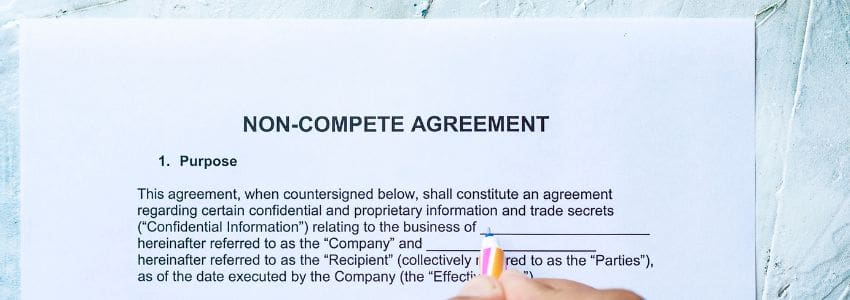Can I Use a Non-Compete Ban In My Workplace?
Last Updated on January 29, 2026 / HR Compliance

HR Question:
Our company is considering the use of a non-compete agreement with some of our employees. In the past I thought they were banned, but I hear about companies using them today. Can I use a non-compete ban in my workplace?
HR Answer:
In many instances you are able to implement non-compete agreements but you need to be aware of the regulations surrounding them. Non-compete agreements continue to change direction and confuse employers and employees. With the FTC abandoning its nationwide ban in 2025, the shift went to more state bans and increased scrutiny in case-by-case enforcement under Section 5 of the Federal Trade Commission Act, continuing to impact employers no matter where you’re located.
What is a non-compete agreement?
A non-compete agreement is a contract an employee signs, usually as a term of employment, that prohibits them from going to a competitor or starting a competing business when they leave the organization. This agreement usually is in effect for a set period – anywhere from one year and up to two years for the most stringent. The agreements often provide stipulations not allowing employees to work for a similar company, industry, and within a region, for that time after leaving the company. Most non-competition agreements are lumped together with other clauses for confidentiality or non-disclosure and non-solicitation rules.
Why do some companies use these agreements?
While there are varied reasons a company may employ this practice, it’s often an attempt to stop employees from leaving, or stop employees who leave from taking information – and their competitive advantage – with them to another organization. While non-compete agreements can be given to all employees, they are most often used for leadership, sales or client management, and those in product innovation and research. Companies want to protect their research, innovation, product information, customer lists or clients, and other aspects of their strategic operations from falling into the hands of competition. Non-compete agreements can discourage this… to some extent.
What precautions do employers still need to take?
Prepare for more scrutiny.
Although the federal prohibition has been lifted, the FTC intends to closely monitor agreements, with particular attention given to notably severe non-compete clauses, especially within industries such as healthcare.
Review state laws for where you employ workers.
As of January 2026, six states have either total or near-total bans with few exceptions – California, Oklahoma, Minnesota, Montana, Wyoming, and North Dakota. Many other states have partial bans and significant restrictions for use. One example is the “garden leave” provision in Massachusetts and Oregon, which requires employers to pay departed employees during their non-compete periods. Some states only allow non-competes for employees earning above a specific salary threshold.
Protect your organization from others’ non-competes.
Work with your candidates to ensure you both can respect terms of a non-compete they could have after leaving one of your competitors. Recruiters often learn that someone is bound by a non-compete from their last employer. If the agreements are not followed and a company decides to act, the worker (and the new employer) could end up in a frustrating, time-consuming, and potentially costly dispute.
Assess your need.
Consider your true purpose and need for non-compete agreements your organization already has in place. Assuming your goal is to protect competitive and confidential information, you may want to consider switching the focus from non-competes to securing confidential knowledge. Non-disclosure, confidentiality, and non-solicitation agreements can be effective in achieving the goal of protecting your business, especially when you ensure they are reviewed by all employees annually. Promote professional norms of conduct around inappropriate information sharing outside of your organization through ongoing communications and training.
Analyze your talent retention approach.
Evaluate your talent retention strategy so you’re not relying on non-competes to keep employees. Do you offer key job components that are key for retention such as flexibility for work-life balance, competitive benefits and fair pay, growth and advancement opportunities, or other meaningful benefits?
According to the Federal Trade Commission – approximately 30 million people – are bound by a non-compete clause and are restricted from pursuing better employment opportunities, the reason for the initial, attempted ban in 2024-2025. If you are using one, considering it, or seeing candidates with them, consult your legal counsel and partner with HR to ensure legal and fair practices.
Thank you to Andrea Whalen, Senior HR Business Strategist, for contributing to this edition of our HR Question of the Week.
Clark Schaefer Strategic HR (CSSHR) knows that keeping abreast of HR compliance issues can be daunting, especially when the laws keep changing. We can help you stay compliant by offering resources to help you identify and mitigate compliance issues, such as our HR Audit to identify trouble spots in your HR function. Check out our HR Compliance & Recordkeeping page to learn more or contact us today!





